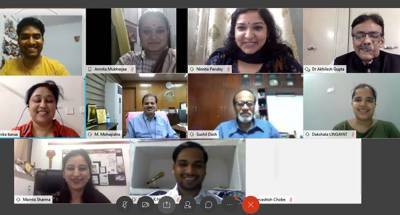HYDERABAD, 26 July 2020: The impact of climate variability on agriculture was highlighted in a panel discussion conducted under the aegis of the Department of Science and Technology, Government of India.
Experts in weather and climate research sciences from across India participated in the discussion, contributing their ideas towards the Science and Technology Innovation Policy 2020 (STIP 2020).
The online event Across the Table – Weather and Climate Research Services in India, saw the experts weigh in on the best ways to deal with extreme climate events, variability with respect to forecasting, infrastructure, agriculture and so on.
Dr Mamta Sharma, Theme Leader, Integrated Crop Management, ICRISAT, especially underlined the effects, mitigation methods and the way forward for extreme weather-related impacts on crops.
Speaking about the adverse effects of climate change on agriculture, Dr Sharma said that despite high-yielding varieties and infrastructure such as advanced irrigation facilities, several challenges have arisen in the past decade – rising temperatures, increasing incidences of drought, erratic rainfall distribution, soil moisture stress, increasing greenhouse gas emissions – which directly and indirectly impact crop production.
However, she remained positive as there was a lot of research in progress thanks to the impetus received from the government of India and due to the synergistic efforts of several research institutions to find solutions.
“Preparedness is the key,” said Dr Sharma, referring to ways in which Indian agriculture could combat the adverse climate. “There is a need to reorient our cropping systems towards more climate-resilient crops such as millets and sorghum. Also, we need investment support to conduct advanced research in these crops, and we need to build the required infrastructure to support such research.”
She also mentioned that weather forecasting systems are of prime importance as they spanned the gamut from ‘what the weather will be’ to ‘what the weather will do’. “Climatologists, modelers, agricultural scientists. all need to work together to find innovative solutions to the impact of climate variability in plants.” she said.
Highlighting the need for capacity building, Dr Sharma said, “We have a long way to go before technologies such as artificial intelligence and machine learning can reach farmers. The government can play a key role in facilitating training programs for these stakeholders – right from scientists to the extension personnel and farmers.”
She remarked that international research organizations such as ICRISAT could act in an interconnecting capacity – connecting various stakeholders to technology disseminators.
Conducted by the Science Policy Forum in partnership with Gubbi Labs, the online event Across the Table – Weather and Climate Research Services in India was live streamed on YouTube to thousands of viewers on 11 July.
The discussion was moderated by Dr Akhilesh Gupta, Head, Policy Coordination and Program Management Division, DST, STIP2020 Secretariat, and Dr Nimita Pandey, STIP 2020 Secretariat.
Other panelists were Prof SK Dash, President, Indian Meteorological Society; Dr M Mohapatra, Director General, Indian Meteorological Department, Ministry of Earth Sciences, Government of India; Vinson Kurian, Senior Deputy Editor, The Hindu Business Line; and Prof Anamika Barua, Professor, Indian Institute of Technology, Guwahati.
From ICRISAT




















